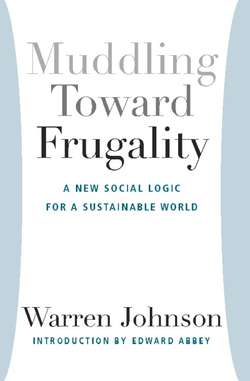Читать книгу Muddling Toward Frugality - Warren Johnson - Страница 5
На сайте Литреса книга снята с продажи.
ОглавлениеEDWARD ABBEY ON MUDDLING TOWARD FRUGALITY
Granted, the title lacks—panache. “Muddling” has a weary, faintly comic sound, while “frugality,” a strange old-fashioned word in opulent America, generates no sex appeal whatsoever. This book will not likely reach the bestseller lists, unfortunately, nor will it create either cult or coterie for the author. And yet the title is exactly right for the book, humble but precise, and this is a good book.
Mr. Johnson’s thesis can be summarized without much difficulty: after generations of extravagant and reckless industrial expansion, we are clearly entering an age of economic scarcity. While human demands continue to rise, natural resources, especially the non-renewable kind, become harder to find and more expensive to extract, process, transport and distribute. This simple brute fact is the basic cause of inflation, despite the inability of most professional economists to see it. (The “dismal science” has never been more dismally obtuse than it is today.) The law of diminishing returns is coming into effect. Technological developments can delay the process but not halt or reverse it; nor can we rely on government or big business to save us. Planning for further growth delays the adjustments that must be made, makes a fair sharing of necessary sacrifices more troublesome, and if carried too far will make more severe and painful the inevitable decline of the international economic machine. The best way to deal with the end of affluence is to accept it—not fight it—and to begin, here and now, the unavoidable adaptations, on an individual, family, and community basis. Piecemeal, experimental, and muddling.
This of course is the conservative approach to the future, conservative in the true, honest, root meaning of the word, and will be dismissed with impatience by those who still yearn for dramatic breakthroughs, global industrialism, a planetary state under the domination of Capitalism or Communism or some convergent combination of the two. We need heroes, the critics will cry, bold and giant figures—tragic heroes!—who will lead us on to ever grander adventures, up to the pyramids of power and beyond—ad astra. To the stars.
Anticipating this objection, Mr. Johnson offers us the comic hero. The tragic hero is always willing to risk everything (including our well-being) for his vision of the ideal. Modern history gives us numerous examples of the type. The comic hero, however, is more concerned with survival. Survival in comfort. Good food, adequate shelter, a decent wine, the love of wife and friends and neighbors, a satisfying job, a supportive community to live in, these comprise for the comic hero the essentials of a good life.
The comic hero is a muddler. He makes a science of muddling, that is, of feeling his way step by step through problems that allow no bypassing and cut off retreat. He is satisfied with small gains and willing to make small sacrifices. He distrusts abstractions, grand generalizations, all-embracing ideologies. When possible he dodges war, whether a war against another nation, another people, or against nature. He is ready to adapt and change when necessary rather than cling with loyal desperation to any cause, however traditional, that is clearly getting him into more and more trouble. He is ready, among other things, to give up his gas-hog pickup for a bicycle, his cross-country vacation tour for a walk in the hills, his color TV for a ballgame in the park, when the advantages of so doing become apparent. And he has enough foresight to surrender a job in a doomed industry—automobiles, for example—when a chance appears to make a living elsewhere. Before it is too late. Before he is trapped.
None of these ideas may seem new. They are not. Most good ideas are as old as humankind. The value of Mr. Johnson’s book lies in his synthesis of several old ideas—voluntary simplicity, for example, and friendship, and community citizenship—in a sensible program for an entire nation. He does not propose to save the world. The rest of the world, as he makes clear, must save itself, and in this endeavor, as he points out, the so-called under-developed lands have in some respects a head start against the over-developed lands such as the United States. The majority of the people of Mexico, for instance, are well accustomed to poverty; if they can find a way to bring their population into balance with their land and its resources, and learn to share those resources in an equitable manner (through another revolution, if necessary), they will be better off than we North Americans, for whom frugality and commonwealth remain exotic, dangerous heresies.
Muddling Toward Frugality is a hopeful book, despite its title. Mr. Johnson shows in what I find a persuasive argument that if we have enough time, and if we begin to change our ways now, voluntarily, with patience, good humor and good will, we can not only avoid calamity but even regain a saner, easier, more rewarding way of life. It is too late to return to the lost Eden of a hunting and gathering tribe—there are far too many of us—but not too late to work out a reasonable compromise among the various possibilities of science, technology, democratic culture and agriculture. We might even find ways to create a society of humans worthy of the name of civilization. There is always hope, and where there’s hope there is life.
This essay was originally published in The Co-Evolution Quarterly, Summer 1978, reprinted here by kind permission of Stewart Brand.
